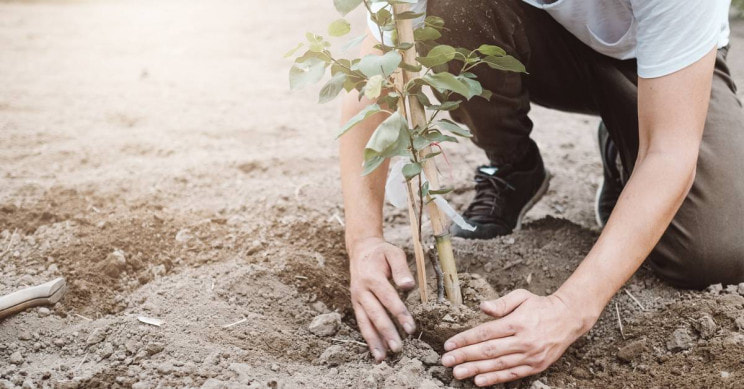By Anika Molesworth?If youíre concerned about climate change, then you have to help drive change.†Because time is no longer on our side.†All too often we think, I canít do it. I donít know enough. Iíll get difficult questions from...
By Anika Molesworth?
If youíre concerned about climate change, then you have to help drive change.
†
Because time is no longer on our side.
†
All too often we think, I canít do it. I donít know enough. Iíll get difficult questions from friends. I canít influence the right people. Nowís not the right time. We fill our heads with excuses about why we as individuals can sit this one out. That thereís someone else who will do it for us.
†
Unfortunately, I donít believe thatís true. No one can do the work that you can do or influence in the way you can influence. And no one is going to save the world for us if we as individuals donít make the effort to save it ourselves.
†
So here are ways that you can drive change.
†
Use your consumer influence:Be informed. Read articles and reviews on goods and services, and seek out those with high social, environmental and ethical standards.Invest your money where it matters. Move your money to banks and superannuation companies that are investing in a clean, green future.Power your home with renewable energy. Look at installing solar panels on your roof. If youíre extracting from the grid, support an energy company that supports renewable energy.Eat food that has a low-carbon footprint.Donít use single-use plastics.Donít buy needless things. If youíre buying a gift for a birthday or Christmas Ė make it something meaningful and not something that is going to end up in the bin!Can you buy in bulk to reduce packaging?†Donít eat at cafťs that use throw-away plates or plastic cutlery. Carry a keep-cup for your coffee. †
Use your political influence:Engage with local, state and federal elected representatives. All parties at all levels of government need strong, science-based climate and energy strategies. Let them know you and your community cares!Engage with your local city council and give them ideas on how your local area can reduce its emissions or improve its recycling. Offer support.Get your city to Declare a Climate Emergency, and put in place strategies to reduce emissions and adapt to changes.Run for politics. Be the leader youíve been waiting for. †
Use your social influence:Learn as much as you can on climate change Ė its impacts and how to address it. When you are well informed, you can help inform others and come up with new solutions. Read, watch and listen to climate change reports and credible news.Speak to your local radio. Get the message out there.Write a Letter to the Editor of your local or regional or a national paper. Then write another, and another.Engage in a conversation with your family and friends. Our most trusted messengers are those in our inner circles! If anyone can convince them to think about the climate, itís you!Contribute to blog sites. Contribute your ideas on how you think we can solve these problems.Use social media to spread the word on what is going on, and what can be done.Join a group working on these issues. You can give them your time, your knowledge and skills, or donate money to support their work. †
Use your household influence:Donít needlessly waste electricity. Turn off the lights, the TV, the air-conditioning when they are not needed!If youíre renovating or building, use sustainable materials, double-glaze your windows, can you use your grey water in the garden?Plant trees.Reduce Ė avoid buying new stuff! Minimize the amount of waste produce.Reuse Ė use materials more than once. Borrow items from family/friends. Or fix broken objects before looking at buying something new.Recycle/compost Ė use materials to make new products.Fly less. Can you Skype/Zoom into a meeting instead of catching a flight? Can you visit somewhere local for your next holiday instead of a far-away place? If youíve got to fly, then off-set your carbon emissions.Limit your car use or look at electric/hydrogen/hybrid cars. Or ride a bike!Have fewer children.Have fewer carnivorous pets.Use energy and water efficient white-goods.Donít waste food! Identify ways to buy, store, serve food so it doesnít end up being wasted. If you have waste food, create a compost bin or worm farm to make fertile soil that improves plant growth in your garden. †
Use your community influence:Encourage your kidís school to deliver environmental topics in classes. Can you offer to give a talk to the school?Encourage your workplace to raise its environmental standards. Get your workplace to reduce, reuse, recycle, and not waste energy. Donít leaver air-conditioners and lights running when everyone has gone home! Is your workplace using a bank that is climate-conscious?Encourage your sector to lift its game and to become a leader on climate action. Use your knowledge and influence to change the narrative and drive change from the sector you are involved with.Contribute to discussion and consultation processes. Speak up and speak often.Seek out like-minded people to support and motivate each other. †
†
Every person can help make their household, workplace, school, local council, or industry sector better for the planet.
†
And if everyone decided to help drive change, just image what we could achieve!
If youíre concerned about climate change, then you have to help drive change.
†
Because time is no longer on our side.
†
All too often we think, I canít do it. I donít know enough. Iíll get difficult questions from friends. I canít influence the right people. Nowís not the right time. We fill our heads with excuses about why we as individuals can sit this one out. That thereís someone else who will do it for us.
†
Unfortunately, I donít believe thatís true. No one can do the work that you can do or influence in the way you can influence. And no one is going to save the world for us if we as individuals donít make the effort to save it ourselves.
†
So here are ways that you can drive change.
†
Use your consumer influence:Be informed. Read articles and reviews on goods and services, and seek out those with high social, environmental and ethical standards.Invest your money where it matters. Move your money to banks and superannuation companies that are investing in a clean, green future.Power your home with renewable energy. Look at installing solar panels on your roof. If youíre extracting from the grid, support an energy company that supports renewable energy.Eat food that has a low-carbon footprint.Donít use single-use plastics.Donít buy needless things. If youíre buying a gift for a birthday or Christmas Ė make it something meaningful and not something that is going to end up in the bin!Can you buy in bulk to reduce packaging?†Donít eat at cafťs that use throw-away plates or plastic cutlery. Carry a keep-cup for your coffee. †
Use your political influence:Engage with local, state and federal elected representatives. All parties at all levels of government need strong, science-based climate and energy strategies. Let them know you and your community cares!Engage with your local city council and give them ideas on how your local area can reduce its emissions or improve its recycling. Offer support.Get your city to Declare a Climate Emergency, and put in place strategies to reduce emissions and adapt to changes.Run for politics. Be the leader youíve been waiting for. †
Use your social influence:Learn as much as you can on climate change Ė its impacts and how to address it. When you are well informed, you can help inform others and come up with new solutions. Read, watch and listen to climate change reports and credible news.Speak to your local radio. Get the message out there.Write a Letter to the Editor of your local or regional or a national paper. Then write another, and another.Engage in a conversation with your family and friends. Our most trusted messengers are those in our inner circles! If anyone can convince them to think about the climate, itís you!Contribute to blog sites. Contribute your ideas on how you think we can solve these problems.Use social media to spread the word on what is going on, and what can be done.Join a group working on these issues. You can give them your time, your knowledge and skills, or donate money to support their work. †
Use your household influence:Donít needlessly waste electricity. Turn off the lights, the TV, the air-conditioning when they are not needed!If youíre renovating or building, use sustainable materials, double-glaze your windows, can you use your grey water in the garden?Plant trees.Reduce Ė avoid buying new stuff! Minimize the amount of waste produce.Reuse Ė use materials more than once. Borrow items from family/friends. Or fix broken objects before looking at buying something new.Recycle/compost Ė use materials to make new products.Fly less. Can you Skype/Zoom into a meeting instead of catching a flight? Can you visit somewhere local for your next holiday instead of a far-away place? If youíve got to fly, then off-set your carbon emissions.Limit your car use or look at electric/hydrogen/hybrid cars. Or ride a bike!Have fewer children.Have fewer carnivorous pets.Use energy and water efficient white-goods.Donít waste food! Identify ways to buy, store, serve food so it doesnít end up being wasted. If you have waste food, create a compost bin or worm farm to make fertile soil that improves plant growth in your garden. †
Use your community influence:Encourage your kidís school to deliver environmental topics in classes. Can you offer to give a talk to the school?Encourage your workplace to raise its environmental standards. Get your workplace to reduce, reuse, recycle, and not waste energy. Donít leaver air-conditioners and lights running when everyone has gone home! Is your workplace using a bank that is climate-conscious?Encourage your sector to lift its game and to become a leader on climate action. Use your knowledge and influence to change the narrative and drive change from the sector you are involved with.Contribute to discussion and consultation processes. Speak up and speak often.Seek out like-minded people to support and motivate each other. †
†
Every person can help make their household, workplace, school, local council, or industry sector better for the planet.
†
And if everyone decided to help drive change, just image what we could achieve!










